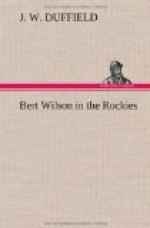If there was life to be discerned anywhere, it was in a group of three young fellows seated near the middle of the car. They would have drawn more than a passing glance wherever seen. Tall, well set up, muscular, they served as splendid types of young American manhood. None of them were over twenty, and their lean, bronzed faces, as well as the lithe alertness of their movements, spoke of a life spent largely in the open. They were brimming with life and high spirits. Exuberant vitality shone through their eyes and betrayed itself in every gesture. That they were friends of long standing was evident from the utter absence of ceremony and the free and easy comradeship with which they chaffed each other.
From the beginning of the trip they had been full of fun and merriment. Their college year had just closed, and they were like frolicsome colts turned out to pasture. There was hardly an incident of the journey that did not furnish to their keen, unjaded senses something of interest and amusement. Their cup of life was full and they drained it in great draughts.
But just now even their effervescence was calmed somewhat by the heat and spirit of drowsiness that hovered over the car.
“Gee,” yawned the youngest of the three, stretching out lazily. “Isn’t it nearly twelve o’clock? I wonder when that dusky gentleman will come along with the call to dinner.”
“Always hungry,” laughed one of the others. “The rest of us eat to live, but Tom lives to eat.”
“You’ve struck it there, Dick,” assented the third. “You know they say that no one has ever been able to eat a quail a day for thirty days hand running, but I’d be willing to back Tom to do it.”
“Well, I wouldn’t quail at the prospect,” began Tom complacently, and then ducked as Dick made a pass at him.
“Even at that, I haven’t got anything on you fellows,” he went on, in an aggrieved tone. “When you disciples of ‘plain living and high thinking’ get at the dinner table, I notice that it soon becomes a case of high living and plain thinking.”
“Such low-brow insinuations deserve no answer,” said Dick severely. “Anyway,” consulting his watch, “it’s only half-past eleven, so you’ll have to curb the promptings of your grosser nature.”
“No later than that?” groaned Tom. “I don’t know when a morning has seemed so long in passing.”
“It is a little slow. I suppose it’s this blistering heat and the long distance between stations. It’s about time something happened to break the monotony.”
“Don’t raise false hopes, Bert,” said Tom, cynically. “Nothing ever happens nowadays.”
“Oh, I don’t know,” laughed Bert. “How about the Mexican bandits and the Chinese pirates? Something certainly happened when we ran up against those rascals.”
“They were lively scraps, all right,” admitted Tom, “but we had to go out of the country to get them. In the little old United States, we’ve got too much civilization. Everything is cut and dried and pared and polished, until there are no rough edges left. Think of the fellows that made this trip across the continent sixty years ago in their prairie schooners, getting cross-eyed from looking for buffalo with one eye and Indians with the other, feeling their scalp every five minutes to make sure they still had it. That was life.”




